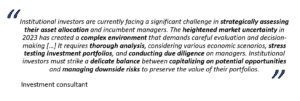09/10/2023
John Allen Paulos
A saying that has proved itself true once again. Uncertainty was one of the key challenges mentioned by nearly all of the 18 institutional investors[1] that took part in Research in Finance’s latest UK Institutional Market Study (UKIMS) online community.
Conflict in Ukraine and political instability in the UK are, for now, the new norm, which has led to a high inflation environment and higher interest rates. The result is an increasingly challenging environment for pension schemes, as they look to face a period characterised by lower returns, increased volatility and the threat of persistent uncertainty. This uncertainty has brought about various challenges and a need for institutional investors to reassess their short and longer-term strategies. In this article we give an overview of the three biggest challenges that our institutional investor community said they are currently facing:
1. Managing liquidity
The most frequently mentioned challenge by institutional investors in our online community is managing liquidity. One year on from the LDI (liability-driven investments) crisis in Autumn 2022, sparked by Liz Truss’ and Kwasi Kwarteng’s mini-budget announcement, there still exists a great deal of caution among several UK pension schemes regarding illiquid assets.
It is well-known in the UK institutional market that the chaos in Autumn 2022 helped certain DB (defined benefit) schemes who were in a strong position regarding their funding level, with their maturity timelines accelerated. Indeed, a recent WTW survey of 84 DB schemes in the UK found that over half (54%) have now brought their endgame plans forward. For other DB schemes who may have had to reassess their endgame strategy over the past 12 months, they will perhaps have to weigh up whether illiquid assets are an investment they can stomach; balancing the needs for a certain level of returns with the uncertainty around access and liquidity.
For DC (defined contribution) schemes, caution stems from a different origin. Many see private assets and other illiquid investments as both a source of diversification and potential returns. Clearly opportunities are available in the future as innovation and regulation in this area develop. However, DC schemes are currently wary of the risk and costs that these types of investments are associated with, meaning a preference for liquidity is currently taking priority.
2. Deciding on the most appropriate endgame strategy
Increased requirements from insurers for DB scheme buyouts are placing a greater urgency on pension schemes to bring forward their endgame preparations. While most institutional investors who took part in our latest online community are involved in schemes that are looking for an insurer-led buyout, there is recognition that insurers are incredibly busy and require more resources to implement said buyouts. Some institutional investors are uncertain of the best option and mention that they are hopeful more alternative endgame solutions will become available on the market in the near future.
3. Consideration of responsible investing and ESG factors
Particularly pertinent among DC schemes is that scheme managers and trustees are still having to balance the need to optimise returns and reduce volatility, while at the same time consider responsible investment. This involves considering both preferences from scheme members, as well as regulatory demands. The difficulty now is that with inflation still high (6.7% at the time of writing), it is considerably harder than it was previously to identify the responsible investment strategies that will outperform inflation with any degree of certainty. The world of ESG and responsible investing is still evolving, with a huge volume of opinion and debate on the topic overall, as well as the specific solutions and considerations that form part of it. Even the use of the term ‘ESG’ is now up for debate, with Larry Fink, Chairman and CEO of BlackRock, stating that he has stopped using the term as it has become too politicised and ‘weaponised’.
Summary
The balancing act that institutional investors are currently facing is complex and multi-dimensional. It is well articulated in the below quote from an investment consultant involved in our online community:

With a large degree of uncertainty in the market, there is strong demand for tools and analysis that can help institutional investors understand the resiliency of their portfolio as they are forced to plan for a range of scenarios. Now more than ever, they are looking to investment managers to provide regular guidance and actionable thought leadership to inform their plans. There is no silver bullet – but the investment managers most likely to succeed are those who can articulate their technical expertise most clearly, respond to client queries quickly and efficiently, and highlight innovative solutions where relevant. These themes have been constants in RiF’s institutional investment research for several years, however what is clear from our latest research is that these attributes are now more important to institutional investors than they have been at any point in the last 10 years.
If you are an investment manager interested in signing up to UKIMS, please get in touch with Richard Ley ([email protected]) or Mick Hrabe ([email protected]).
If you are a consultant, professional trustee, trustee or involved in some way at a pension scheme and would like to take part in the study, please join our panel here: https://researchinfinance.co.uk/join-the-panel/ or contact Jack Dominy ([email protected]).